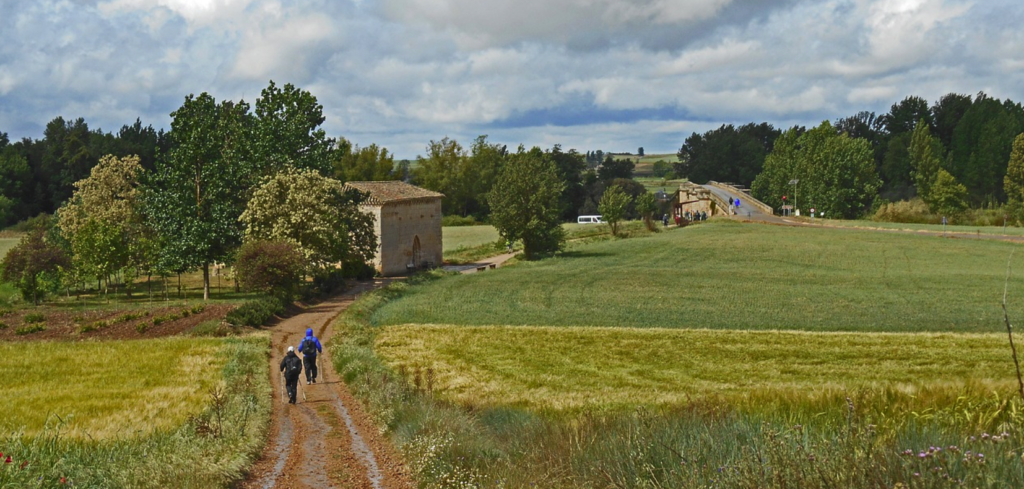
Lessons from the Camino
Tracy Bennett | January 14th, 2023

1) Planning is everything.
Every afternoon I read about the route for the following day, making notes on landmarks to look for and sites to see along the way. While it didn’t guarantee things would go smoothly, I left each morning feeling I was ready for whatever the day brought. As head, doing your homework, anticipating obstacles, and having ready the resources you need ensure you feel prepared, even when the unexpected storm comes your way. It also inspires confidence in your leadership and reassures your team that “we’ve got this!”1
2) Check the forecast.
Often trekking is just putting one foot in front of the other, day after day. But knowing where you are at any given moment and reading the weather matters when you are on the trail and exposed to the elements. It’s critical to keep your eyes on the horizon and the skies. As a school leader it is easy to fall into the trap of just managing the day to day stuff. Keeping up with trends, forecasts, and the latest information decreases the likelihood of a blindsiding event that knocks you off your feet and potentially impacts your school for months or years to come.
3) Embrace the unexpected.
I recall a particular afternoon when every albergue in the town where I planned to spend the night was full. Frustrated, I had to walk on to the next village. Ugh! As it turned out I ended up staying in a charming casa rural where I enjoyed an absolutely lovely evening. Not what I had planned, but a highlight of my trip. Some of the most memorable experiences I had both on the Camino and in schools were the ones I didn’t expect. As a leader, try not to judge, loosen your grip on expectations, and be ready to roll with the punches. You’re likely to be pleasantly surprised if you do!
4) It’s the little things that count.
On my first walk I discovered the most valuable items in my pack were some of the smallest; safety pins and plastic bags. As a head of school, looking after little things makes a big impact. Stacking chairs, shoveling some snow, sending a handwritten note acknowledging an achievement or a loss, expressing gratitude. Small things matter.
5) Take a rest day. Period.
Giving yourself permission to rest—really rest—is critical to physical, emotional, and spiritual health.
6) Don’t be afraid to try new things.
And expect to not like some of them. Pulpo is a delicacy on the northern coast of Spain, and sampling it is a rite of passage for any pilgrim. My first taste of pulpo was not as awful as I anticipated, but it was my last. Remember that ice breaker you were nervous to try at a staff meeting? And how to your surprise it connected your team in new and meaningful ways? Sometimes you just have to do it and decide later if it is worth repeating or not.
7) Take time to enjoy the journey.
I missed this memo during my first Camino when I was pushing every day to hike further and to go faster. The second time around I took the concept of pilgrimage more to heart. I wandered through villages, napped in squares, sat quietly in churches, and tested my limited Spanish with locals. Try to spend your time as school leader as though you are on a journey to be cherished. Spend time experiencing the magic in classrooms, watching spirited children on the playground, and doing those things that fill every head of school with real joy.
8) Build in time for reflection.
Unpack, shower, do laundry, nap, write in my journal, repeat. Every afternoon on the Camino looked the same for me. While unpacking, showering, and laundry were necessities, I was disciplined about journaling too. Taking time to reflect every day nourished my sense of well being and intention. What did I observe? What did I want to think more about? What did I learn about myself? Despite jam-packed days, it is essential for leaders to develop the discipline to regularly set aside quiet time for deeper thinking, reflection, and gratitude.
9) Don’t be afraid to ask for help.
At the end of my first day I arrived in the town of Hondarribia, exhausted, after walking 20 miles (six in the wrong direction!) and needed to find the hostel where I would be staying for the night. I stopped in a bar for directions and a young couple, seeing my fatigue, immediately offered to give me a ride. I could not have been more grateful. As a leader it can be hard to ask for help and even harder to accept it. You are not superhuman and, fortunately, no one expects you to be. You can ask for assistance, delegate, and allow others to run the show now and again without concern.
10) Invest in good boots.
Not a place to scrimp, good boots make all the difference. Finding a pair that have the right fit, give you plenty of support, and can go the distance is critical for your progress on the trail. This is true for your administrative team as well. A strong, skilled team is crucial to your success as a leader and that of your school. And remember new boots, like new teams, can feel stiff and unfamiliar at first. It might take a little time to feel completely comfortable.
11) Use earplugs.
A constant source of discussion among pilgrims is the challenge of sleeping in a room of 20 bunkbeds filled with strangers, most of whom are snoring loudly. Good earplugs are key and allow you to read and sleep without distraction. As a school leader it can be challenging to tune out the noise and not get wrapped up in frustration, even anger, over the inconsiderate words and actions of others. Filtering out the irritating commentary that you can’t do much about makes for better, clear headed, rested, leaders.
12) Know when it’s time to change direction.
I am what you might call, “geographically impaired.” I can’t read a map to save my life, and have little to no inherent sense of direction. However, I do know when it’s time to call it quits and turn around. I think this is one of the most valuable skills a head can model and use. It’s ok to head down the wrong path accidentally—but not to keep going once you know it’s not taking you and your community where you need to go.
13) Find your people.
Traveling any road by yourself can be lonely. Communal meals with pilgrims at the end of hard days offered a much-needed opportunity to commiserate, celebrate, and share helpful information. Being a head of school can be an isolating and solitary experience. No one on your team or board can really understand the challenges and the exhaustion, as well as the joy and sense of significance that you experience daily. Finding other heads to walk beside you can lighten your load and make the journey so much more enjoyable.
14) Celebrate your accomplishments!
Walking into the plaza surrounding the Cathedral of Santiago de Compostela, where hundreds of people from around the world finish their pilgrimage every day, is a powerfully emotional experience. Pilgrims are hugging, crying, laughing, and collapsing to the ground. A universal feeling of accomplishment is palpable and celebratory photos abound. But in addition to this final hurrah, I made it a point to celebrate all along the way, often with un helado (ice cream) marking the successes of each day. As a leader, be sure to take time now and again to stand back, look at what you are accomplishing, and celebrate!
Interested in learning more about how we can help?

EXPERTS IN SEARCH, TRANSITION & STRATEGY
